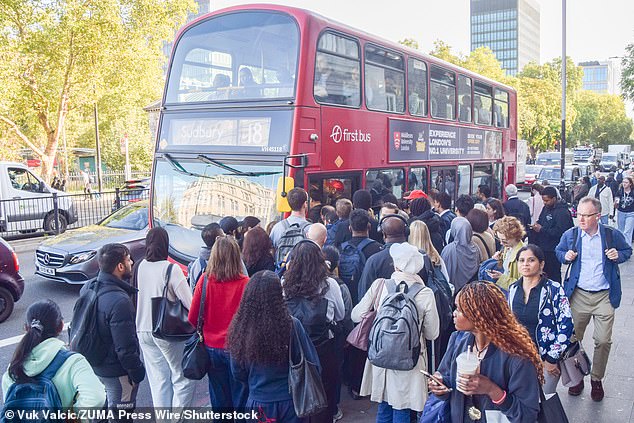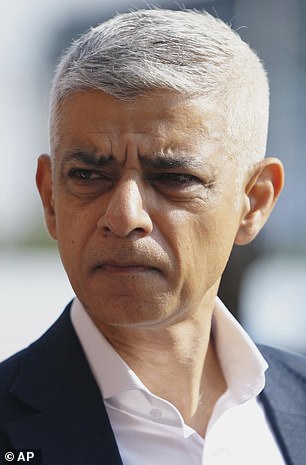Tube workers marked the third anniversary of the King’s accession to the throne by bringing London to a virtual standstill.
As a 41-gun salute reverberated over Hyde Park, there was chaos on the streets with commuters, shoppers and tourists alike experiencing widespread disruption.
Entrances to Underground stations were barred and bus drivers were forced to turn away passengers desperate to get to work. Cycle hire services were sold out and black cabs and Ubers were snapped up in seconds.
Those intrepid souls who tried to drive into town faced frustrating journeys up to three times longer than usual, exacerbated by heavy traffic and the usual, ubiquitous lane closures and roadworks.
Concerts planned for this week, including Coldplay at Wembley, have been cancelled. The band said it had no alternative because there was no way that 82,000 fans could get home safely.
The mayhem was caused by a five-day strike by members of the RMT union, demanding a 32-hour, four-day week and another bumper pay rise on top of their current £65,000 to £72,000 salaries. They also want a taxpayer-subsidised 75 per cent discount on all rail travel, not just in London.

Entrances to Underground stations were barred and bus drivers were forced to turn away passengers desperate to get to work
Negotiations have been going on for nine months, since shortly after the RMT accepted rises of up to 6.6 per cent last November. They were always going to come back for more. Union leaders in the public sector assume, with justification, that a Labour mayor and a Labour government will be a guaranteed soft touch.
Yet as the strike got under way, London’s two-bob chancer of a mayor, Genghis Khan, who has overall responsibility for transport, was missing in action. This is the same Khan who promised Londoners there would be no more transport strikes on his watch. Last year he managed to find £30 million down the back of the sofa to avert another threatened Tube strike.
Apparently, this time, there’s no money left – to use a well-known expression popular in Labour circles.

Last year Sadiq Khan managed to find £30million to avert another threatened Tube strike
Not that Genghis would have been overly inconvenienced by the walkout, as he has a £350,000 chauffeur-driven, armour-plated Range Rover provided for his ‘security’.
If fuming commuters had spotted him this morning, he’d have needed all the security he could get.
The strike will prove devastating for London’s economy, with lost business conservatively estimated at £230 million. The hospitality sector, hammered by rising energy bills and higher National Insurance payments, will be especially hard hit. Many restaurants, pubs and sandwich shops are already on their last legs. This could tip them over the edge.
London has become an increasingly hostile environment for business. There has been an exodus of high-net-worth individuals, especially non-doms, since Rachel From Complaints’ disastrous budget. This week’s Tube strike will only make London less attractive to investors from overseas.
Under Khan, the war on mobility – motorists in particular – has escalated. Getting round town is a nightmare at the best of times, even when the Underground is running normally.
Cycle lanes, low-traffic neighbourhoods, Ulez and the congestion charge – soon to rise to a usurious £18 a day – are all designed to force people to abandon their cars and use public transport.
But as this selfish walkout illustrates, when people have no alternative other than to rely on public transport, it puts them at the mercy of militant unions like the RMT.
Today’s strike coincided with the annual gathering of the TUC at Brighton. This year, the unions are in particularly truculent mood, worried that with the demise of Ginge Rayner the Government may now water down employment reforms which, among other concessions to ‘workers’ rights’, would make it easier for them to call strikes.
Ironically, the unions should be in a weaker, not stronger, position. Membership of TUC affiliates has fallen to 5.5 million, less than half the 12 million when I was a young industrial correspondent during the 1979 Winter of Discontent.
Their strength comes from the fact that membership is now almost exclusively concentrated in the public and quasi-public sector, giving them a stranglehold over ‘services’. It’s instructive that all the strikes since Labour came to power have been on the railways, in the NHS, by Birmingham’s dustmen etc.
Downing Street has urged a return to work, but is pretty impotent, especially after caving in to outrageous pay demands since taking office. And Surkeir is over a barrel, as some unions are threatening to stop funding Labour unless they get everything they want.
Just as in 1979, union militancy – along with general uselessness – will doom Labour to inevitable defeat at the next election.
For the moment, the Tube drivers are filling their boots. What next – they’ll be wanting to work from home?
But they could soon be on a No-Day Week. They are headed for extinction, just like the Fleet Street printers before them. The technology for driverless trains already exists and has been operating successfully for decades not just abroad but on London’s Docklands Light Railway.
While Khan and Labour won’t implement driverless trains, a future Reform or Reform/Tory coalition would have no such hesitation.
That day can’t come soon enough – and would be greeted by London’s downtrodden commuters with a 41-gun salute.












